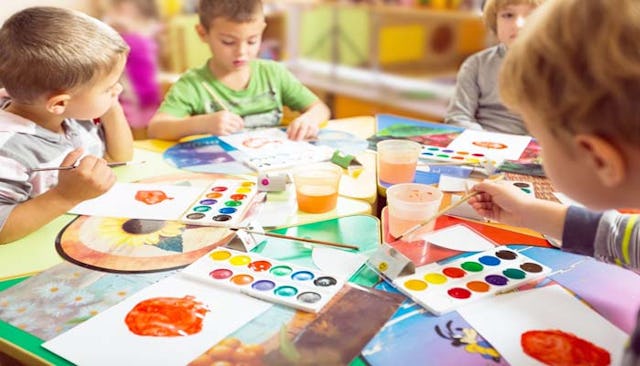Preschool Is Becoming More Academic. What The Heck Are We Doing?

New book focuses on what preschoolers really need from adults: more time to play
You often hear parents complain about how much harder kindergarten has become for children. I’m one of them. My son started kindergarten at four because he met the age cutoff in New York, and I ended up pulling him and putting him into a private pre-K two months later. No, I couldn’t really afford it. But I also couldn’t afford to have my child come home everyday and say that he “hated school” was “tired” and “sad.”
With kindergarten in many states now a six hour day with one 20 minute recess, it’s not surprising that preschools would be stepping up to prepare children for that. In her new book, “The Importance of Being Little: What Preschoolers Really Need from Grownups” early childhood educator Erika Christakis argues that today’s youngest “schoolchildren” are spending time in environments that are ignoring their needs.
“The more I observe young children in action, the more faith I have that they are capable and powerful,” Christakis tells Yale News in an interview about her new book. “But our expectations are often mismatched: We ask too much of young children pragmatically, but too little of them cognitively. Preschool classrooms are needlessly noisy, over-stimulating, and aesthetically unappealing environments with rapid pacing and jam-packed schedules. There is too much teacher-directed talk on banal topics and insufficient uninterrupted stretches of time to play.”
Play. Uninterrupted stretches of play. Why is it so hard for us to wrap our brains around the idea that this is what children need to grow? Is there really a “lesson plan” in preschool? And if so, why?
Christakis argues that preschool, as it exists today, has “adultified” children. “We construct children’s environments at home and school with adult eyes and adult desires. We expect preschoolers to conform to our time-tables, our habits, our sleep schedules, our electronics usage, our whims,” she says. “But I believe there is a way to be more child-centered, and we can do this without making parents and other adults crazy.”
How? By once again looking at the environment through the eyes of a child, rather than an adult. “When we look at childhood from the preschooler’s perspective, we see many surprises: The small person who dawdles impossibly getting out the door every morning turns out to be the very same person who can hold a newborn baby sibling with the utmost concentration and tenderness,” Christakis explains. “The child who has to be cajoled to cut a piece of red construction paper to make a parent’s Valentine’s Day card can make a meticulous sketch of the grains of beach sand she’s observed under a microscope.”
And we’ve all seen this, haven’t we? Our children being able to focus on many things, but “falling short” in others? I was baffled the first time I got a call from a teacher, telling me that my four-year-old was having a hard time “focusing” in class. Was this the same child who sat for hours, sounding out words in different books and basically “teaching” himself to read before he ever set foot in a classroom? Was this the same child who taught himself how to navigate advanced learning apps on the Leap Frog tablet he used to carry around with him everywhere? My child has always shown a love for learning new things. And was always able to focus on things he loved.
Until he sat in a classroom.
“Teachers need to take the time to listen to children’s stories, to laugh with them, to get down on the floor, at their eye level, and figure out what makes them tick,” Christakis claims. “This kind of respectful observation of what children can (and can’t) do is rare in early childhood settings, where instead too many children receive calibrated doses of highly scripted, one-size-fits-all instruction.”
And she notes that this instruction may be doing more harm than good: “There’s some evidence that children exposed to the same preschool tedium for multiple years — for example, the dreaded daily tracking of the calendar or unvarying class rules at Circle Time — may actually lose interest in school and fare worse on academic learning outcomes in the later years.”
Recently, there’s been comparisons to the way Finland approaches early childhood education, where kids are consistently performing academically superior to ours, and where play is prioritized. Christakis admits that we have to be careful about comparisons because our countries are so different, but also points out :
“The Finnish approach reveres the physical and conceptual space in which to be a young child. They have giant room-sized clothes dryers for snow suits so the kids can be outdoors multiple times during the day. This approach reflects a rather un-American respect for early childhood as a life stage worthy in its own right and not merely as a training ground for an adult future.”
Maybe it’s time we step away from the “training ground” and back to the playground.
This article was originally published on